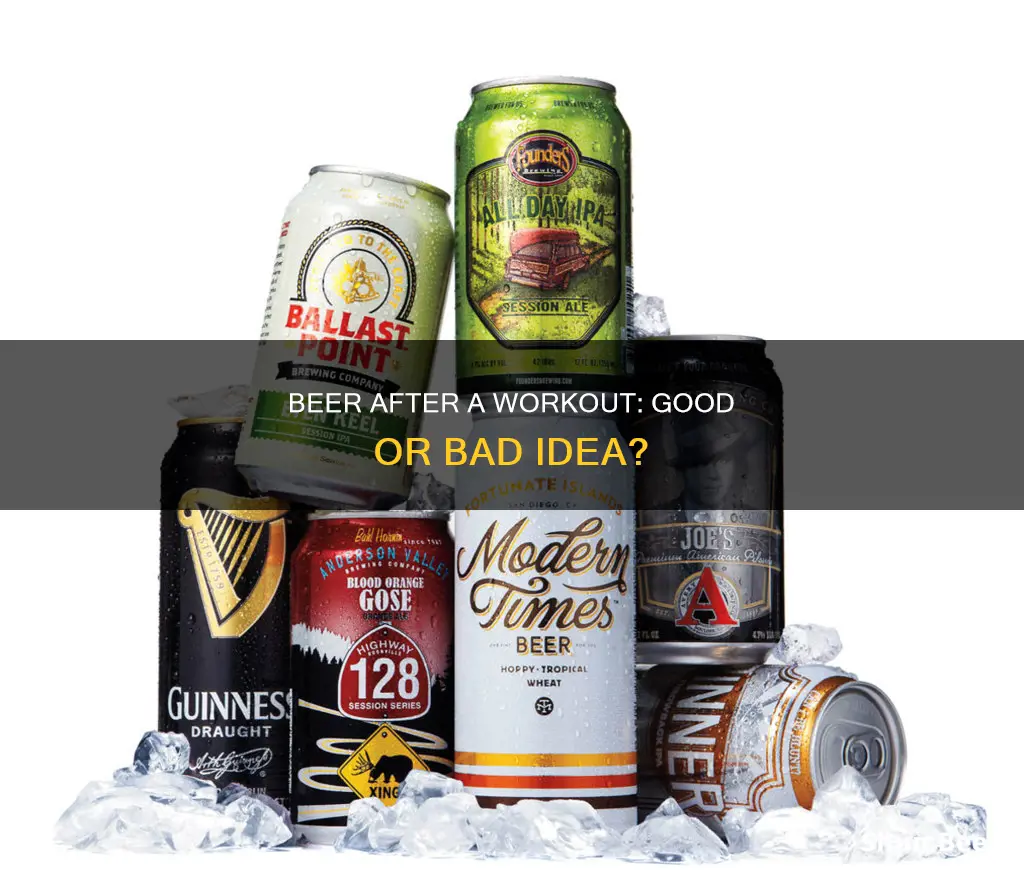
Drinking beer after a workout is a common way to celebrate or socialise with friends. But is it a good idea? The short answer is no. Alcohol is a diuretic, which means it increases urination and can lead to dehydration. This can be particularly detrimental after exercise, as your body is already depleted of fluids and in need of rehydration. Alcohol also impairs muscle recovery and growth, disrupts sleep, and can cause nutritional imbalances, weight gain, and negative interactions with medications. However, having an occasional beer after a light workout is not likely to be harmful, especially if it is a low-alcohol beverage.
| Characteristics | Values |
|---|---|
| Dehydration | Alcohol is a diuretic, causing more urination and dehydration. |
| Recovery | Alcohol impairs muscle recovery and growth by interfering with protein synthesis. |
| Sleep | Alcohol negatively impacts sleep, reducing the secretion of human growth hormone (HGH) necessary for muscle repair and growth. |
| Nutritional Imbalances | Alcohol causes nutritional imbalances, leading to higher cortisol and lower testosterone levels, potential weight gain, and worsened pre-existing conditions. |
| Calories | Alcohol contains calories but offers little to no nutrients, potentially hindering weight loss goals. |
| Electrolytes | Alcohol affects electrolyte levels, which is detrimental to athletic performance. |
| Safety | Drinking alcohol after a workout is generally considered safe in moderation but may impair performance and recovery. |
What You'll Learn

Dehydration
Drinking beer after a workout is not the best idea, as it can dehydrate you. Both alcohol and exercise deplete the body of fluids, and the combination of the two can lead to dehydration. Alcohol is a diuretic, which means that it causes you to urinate more fluids than usual. In some cases, you may need to drink twice as much water after just one alcoholic drink to get fully rehydrated. This is on top of the hydration you need to replace from your workout.
The more you drink, the more your recovery and overall fitness level may be affected. One study showed that people urinated more than usual after drinking a 4% alcoholic drink post-workout, which may contribute to dehydration. It is unlikely that one beer after a workout will cause a harmful level of dehydration, but it may affect your recovery.
To minimise the dehydrating effects of beer after working out, choose something with a lower alcohol content, and be sure to drink plenty of water.
There are plenty of alternatives to beer that won't have as much of a harmful effect on your hydration, and some that could even help your recovery process. Non-alcoholic beer, for example, allows you to enjoy the social aspects of drinking without any of the harmful effects of drinking alcohol.
Drinking Beer While on Shrooms: Safe or Risky?
You may want to see also

Nutritional Imbalances
Although beer contains carbohydrates, it is metabolised and stored as fat, so it does not help with refuelling or rebuilding muscle. According to Kelli Santiago, a board-certified sports dietitian and clinical dietitian at University Hospitals of Cleveland, "Although alcohol primarily contains carbs, it's metabolised and stored as fat so it doesn't help with refuelling or rebuilding muscle."
Beer is also calorie-heavy, with a standard 12-ounce (355-mL) beer containing around 150 calories. If you are exercising to help with weight loss, drinking beer after a workout will not be beneficial.
Sugar-Free Diets: Beer-Friendly or Foe?
You may want to see also

Sleep Disruption
Drinking alcohol can negatively impact your sleep, even if you only consume a small amount. Alcohol affects your sleep by interfering with your sleep cycle, specifically by reducing the time you spend in the REM stage of sleep. This is when your eyes move rapidly, and it is essential for muscle repair and growth. As a result, you may wake up feeling less refreshed and more tired than usual.
Alcohol also increases the likelihood of snoring and developing sleep apnoea, a condition that narrows your airways and can cause breathing problems during sleep. Sleep apnoea can lead to serious health issues such as type 2 diabetes, depression, high blood pressure, and an increased risk of stroke.
To minimise sleep disruption, it is recommended to avoid consuming alcohol at least three hours before bedtime. This will give your body time to process the alcohol and may improve your sleep quality.
Stout Drinking: Bottle or Glass?
You may want to see also

Weight Gain
Alcohol is a source of empty calories, which means it provides a lot of energy but little nutritional value. These calories are more likely to be turned into fat, contributing to weight gain. Even a light beer can have around 100 calories. If you're trying to lose weight through exercise, drinking beer after your workout will work against your goal.
Alcohol also lowers your inhibitions, making you more likely to crave and consume unhealthy foods. This can further derail your weight loss or fitness goals.
In addition, alcohol consumption can negatively impact your sleep. Studies show that getting enough sleep after a workout strengthens your muscles and helps prevent injuries. However, drinking alcohol can disrupt your sleep, reducing the amount of time you spend in important stages of the sleep cycle.
Regular alcohol consumption can also affect your balance and coordination, which may increase your risk of injury during workouts.
If you're concerned about weight gain, it's best to avoid drinking beer or any other type of alcoholic beverage after your workouts. Opt for non-alcoholic alternatives, mocktails, or recovery drinks that provide your body with the protein, carbohydrates, and electrolytes it needs to recover effectively.
While an occasional beer or two after a workout may not significantly impact your weight, regular consumption can lead to weight gain and hinder your fitness progress.
The Science Behind Beer Koozies: Do They Really Work?
You may want to see also

Electrolytes and Carbohydrates
Electrolytes are electrically charged ions that help the body function properly. They assist in maintaining fluid balance, neural activity, and muscle contraction. Sodium, potassium, magnesium, calcium, phosphate, and chloride are all electrolytes. These electrolytes work together to maintain fluid balance within the body, while magnesium and calcium promote optimal muscle function and aid in energy metabolism.
When you exercise, you lose electrolytes through sweat, which can lead to dehydration. This is why it's important to replenish electrolytes after a workout, especially if you're working out at a higher-than-normal intensity or for longer than an hour. Sports drinks like Gatorade or Powerade can help replenish electrolytes, but they often contain added sugars and empty calories. A more natural way to replace electrolytes is to eat a meal rich in sodium, magnesium, chloride, and potassium, such as dark, leafy greens, nuts, fruits, and vegetables.
Carbohydrates are also important after a workout as they provide your body with energy. When you exercise, your body breaks down carbohydrates to use for fuel. Replenishing carbohydrates after a workout helps your body recover and prepares it for the next session. Good sources of carbohydrates include grains, fruits, vegetables, and dairy products.
While beer does contain some carbohydrates and electrolytes, it is not the best choice for post-workout recovery. This is because alcohol can lead to dehydration, interfere with protein synthesis, impair sleep, and contribute to nutritional imbalances. However, having one low-ABV beer (less than 4%) after a workout may be okay and can even be effective for rehydration.
Beer Goggles: The Science Behind Alcohol's Effect on Attraction
You may want to see also







